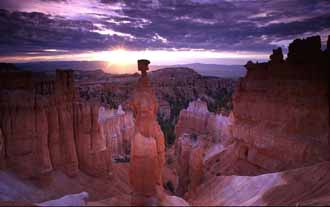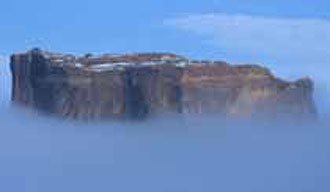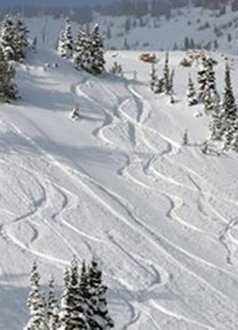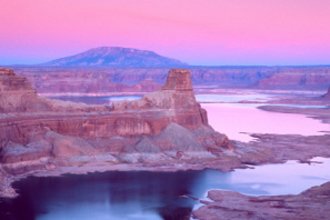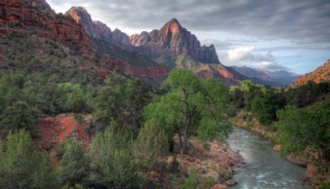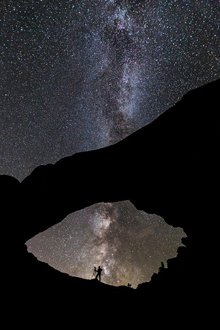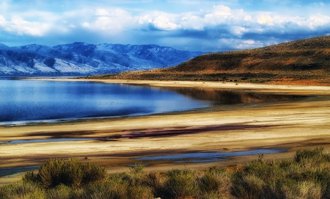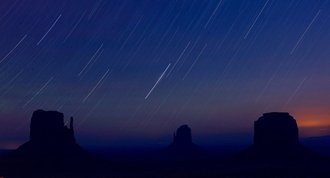Alpine Loop
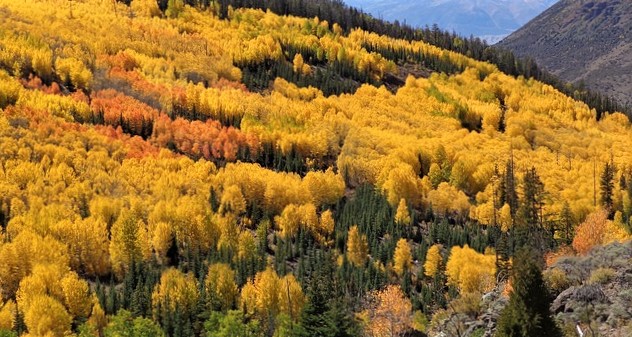
Into The Heart of the Wasatch
If I had to pick a single road that captures the Wasatch Mountains in one tight, twisting ribbon, it’s the Alpine Loop. Officially, it’s named the Alpine Loop Scenic Byway.
It is minutes from suburbia yet the moment you nose into American Fork Canyon, the city falls away and the scent of spruce and aspen takes over. The serpentine road … SR-92 … takes you past steep limestone walls and above the open tree-covered valleys.
Then into the midst of the Wasatch Mountains and the Uinta National Forest before slipping out the far side into Provo Canyon. Mount Timpanogos ... glacier-carved ... towers in the near distance.
The Alpine Loop stretches over twenty miles but it is best enjoyed at a leisurely pace. It’s a drive that can inspire a thousand photo stops. In September and October, you’ll find some of the best fall color anywhere in Utah.
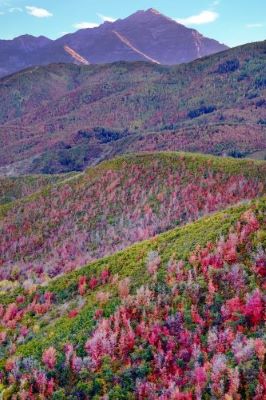
The Byway at a Glance
Take SR-92 from American Fork Canyon over the summit (8,000 feet) then down to US-89 in Provo Canyon. Many people add a short drive along the spur to Cascade Springs.
The Alpine Loop can obviously accessed from the other side … the US/189 Provo Canyon side … and driven the opposite direction. In fact, this was the route that was closed for a period of time this past weekend due to heavy traffic and an unexplained hazard.
Plan on 60 to 90 minutes without stops. Three to four hours if you’re planning on wandering or hiking. Of course, as just mentioned, you can start on the Provo Canyon side and go the opposite direction.
We always seem to come up the American Fork side. We want to get into it as quickly as possible while avoiding Utah County as much as we can.
This is a seasonal mountain road. It typically opens in late May and closes with winter storms in late October/November (weather can shift those dates). In 2025, for example, UDOT announced the Alpine Loop reopened on May 26.
The road is narrow and winding. That’s what makes it so cool. Vehicles over 30 feet aren’t recommended. If you’re in a long RV, park it and take a smaller vehicle.
In fact, I saw a recent post from someone who drove the Alpine Loop in a truck. Their statement was that “it was a little hairy in a truck.” Even a large truck may test your driving skills.
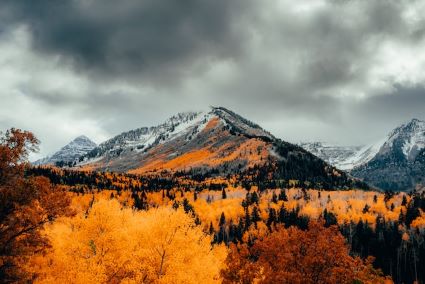
American Fork Canyon to the Summit
Enter from American Fork Canyon and the walls close in fast. Pullouts reveal the river below and limestone cliffs above. A classic Wasatch winding canyon road that takes you to the summit through a varied terrain.
Actually, before entering the canyon, you’ll pass the Timpanogos Cave National Monument visitor center and entrance. Cave tours are seasonal, ticketed, and they sell out regularly.
Reserve in advance … 30 days out to be safe … and expect small-group tours. Even if you’re only driving through, this is a handy stop for restrooms and ranger info.
Simply driving SR-92 without using day-use sites doesn’t require forking over a fee. If you stop to use Forest Service facilities (picnic areas, trailheads, etc.), you’ll need a Uinta-Wasatch-Cache NF recreation pass (3-day, 7-day, or annual).
Current published rates in 2025 are $10 for 3-days, $20 for 7-days and $60 for an annual pass. They are honored across the American Fork Canyon/Alpine Loop and Mirror Lake Scenic Byway routes. America the Beautiful and other federal passes are accepted for standard amenity sites.
From here the Alpine Loop climbs into aspen country … the kind that glows gold in late September and early October. Clear mornings on the crest can show off the glacier-carved bowls of Mount Timpanogos in the distance.
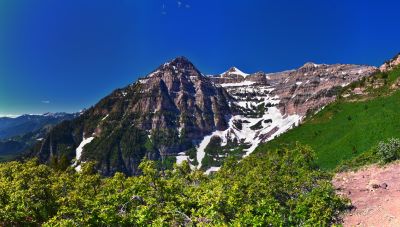
Summit to Sundance & Provo Canyon
Dropping off the high point, the right fork winds toward Sundance Mountain Resort and the Aspen Grove area. This middle stretch is where the scenery gets intimate.
Expect scenic peeks through the trees, creeks tumbling under the road, and trailheads tucked into shady pockets. And viewing wildlife … watch out for the deer … is a possibility anywhere along the route.
Stewart Falls is the can’t-miss family hike here. Start from Aspen Grove. The Sundance-only route is for resort guests. Expect 3.4 miles roundtrip to a two-tiered waterfall. It is spectacular in summer and bright with leaves in the fall.
Robert Redford’s (formerly) Sundance Mountain Resort … he sold it in 2020 … hums in summer with chairlift rides, hiking, and patio dining. It’s a pleasant place to linger. Grab lunch, ride the lift, then rejoin the byway to finish the loop.
Sundance, of course, gets its name from Butch Cassidy and The Sundance Kid. Redford was the Sundance Kid in the movie, of course, but he filmed Jeremiah Johnson entirely in these canyons.
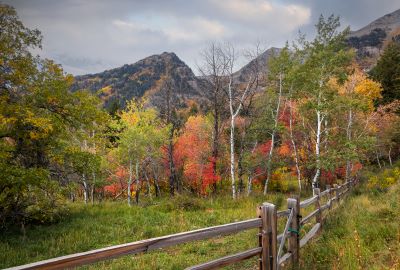
The Cascade Springs Detour (Do It)
Near the top is a spur headed left towards Cascade Springs. It is an idyllic mountain spring setting. There’s a ¼-mile boardwalk leading you over crystal clear pools and terraced mini-falls.
Filled with fish and lush with aquatic plants, you may not want to leave. The pools are fed by a massive underground spring system.
Cascade Springs is one of those places where you say, “We’ll stay ten minutes,” and end up staying an hour.
When to Drive the Alpine Loop
Late September to early October is prime. Weekdays or early mornings may help you beat the leaf-peeping traffic.
In summer, wildflowers and cool mountain temperatures beckon. As do hiking trails, picnic areas, and the cave. The road usually opens in late May. This can vary with the snowpack.
In winter, the Alpine Loop Scenic Byway closes. Lower canyon areas remain accessible but the loop gates are locked.
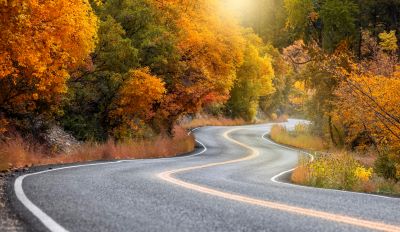
Practical Tips
- Passes & payments: If you plan to stop … picnics, trailheads, Cascade Springs … pick up a 3-day or 7-day pass (or annual if you’re a regular). These cover Alpine Loop facilities and Mirror Lake Highway sites as well.
- Road etiquette: Expect tight turns and cyclists. Use pullouts. Keep it in low gear on the descent to save your brakes. Vehicles longer than 30 feet are strongly discouraged.
- Reservations: Timpanogos Cave tours are limited and often sell out. Book on their website up to 30 days ahead at https://www.nps.gov/tica/index.htm
- Trailheads to know: Stewart Falls (Aspen Grove), Timpooneke (gateway to the Mount Timpanogos trails), and the Cascade Springs loop. Expect full lots on fall weekends.
- We like to start from the American Fork Canyon side in early or mid-morning. The cave visitor center might be worth a short stop. Summit pullouts offer incredible views.
- A friend told me that Sundance has an excellent Sunday Brunch at the Foundry Grill. $50 - $60 apiece including tip.
Why It Belongs on Your List
The Alpine Loop is more than a just a scenic drive. It’s a sampler platter of the Central Wasatch. It includes a national monument with glow-in-the-dark cave tours?
How about a storied mountain resort? And family-friendly boardwalks over blue springs. The big-mountain views don’t require a full-day commitment or a big cash outlay.
If you’re building a Utah itinerary that balances easy wins with real wow, the Alpine Loop Scenic Byway is an easy “yes.”
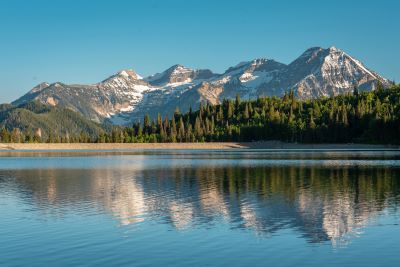
Need-to-Know (Quick Reference)
One thing to keep in mind about the Alpine Loop. It’s an extremely popular drive in the fall especially on the weekends.
In fact, as I’m writing this in late September 2025, the byway was closed this past weekend from the US/189 Provo Canyon side for a period of time.
It was due to extremely heavy traffic but there were also reports of some kind of road hazard. With such heavy traffic, it wouldn’t take much for it to back up as this closure illustrates.
On any weekend, especially during the fall, check the UDOT website for conditions and closures. Closures may occur due to heavy traffic or natural events such as rockfalls, mudslides or floods.
- Official name: Alpine Loop Scenic Byway (SR-92).
- Distance: 20 miles (plus short side road to Cascade Springs.
- Season: Late May to late Oct/Nov depending on road conditions.
- Fees: Driving only - no fee. Using recreation sites—$10 (3-day), $20 (7-day), $60 annual. Federal lands passes are honored. Cave tours require separate tickets.
- Big stops: Timpanogos Cave NM, Sundance Mountain Resort, Stewart Falls, Cascade Springs.
Have A Great Story About Utah's
Scenic Byways?
Do you have a great story about this or any of Utah's scenic byways? Share it!


